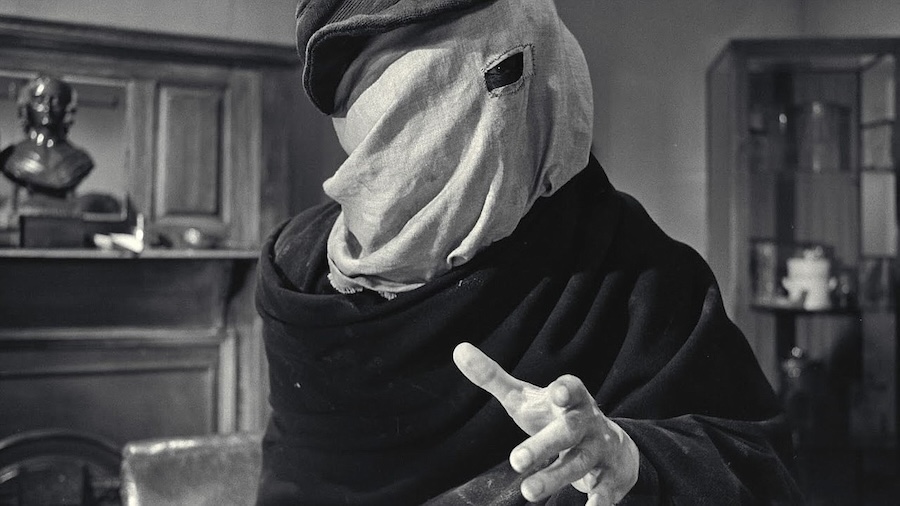
A TRUE STORY OF COURAGE AND HUMAN DIGNITY.

In 1979, John Hurt terrified a whole world in the sci-fi-horror movie Alien, in a sequence that required a lot of special makeup effects. One year later, he played another character where the makeup added a lot to his performance. In fact, Wally Schneiderman’s and Christopher Tucker’s work was so impressive and important for The Elephant Man that when its eight Oscar nominations were presented and none of them honored the makeup design, there was outrage.
The following year, the Academy had created a new permanent category: Best Makeup. But there’s more to The Elephant Man than the mask.
Examined in secret
In 1880s London, surgeon Frederick Treves (Anthony Hopkins) visits an East End freak show where he comes upon a horribly disfigured man (Hurt), ”owned” by the brutal Mr. Bytes (Freddie Jones). John Merrick is the man’s name and Bytes considers him ”an idiot”. So does Treves, at first, who pays Bytes to have ”the elephant man” examined in secret at his hospital. Some time later, Merrick is presented to other physicians as an example of extreme physical deformation; little attention is paid to Merrick’s mind and the patient doesn’t talk much. In order to convince his superior, hospital governor Francis Carr Gomm (John Gielgud), that Merrick is intellectually capable, Treves teaches him part of the 23rd Psalm and a few conversational niceties.
Carr Gomm sees right through this performance, but suddenly Merrick is able to continue reciting the 23rd Psalm, parts Treves never taught him. The patient does know how to read, telling the men that the 23rd Psalm is his favorite part of the New Testament. ”The elephant man” gains a new status in London society, but Bytes isn’t ready to give up on his valuable possession…
Insisted on no credit
The original script came into Mel Brooks’s hands after the making of High Anxiety (1977). His assistant director, Jonathan Sanger, had optioned it and wanted David Lynch to direct. Brooks saw Lynch’s first film, Eraserhead (1978), and loved it. He agreed to executive-produce, as long as he received no credit; after all, his name was too closely associated with comedies and he wanted this dark drama to be taken seriously. The Elephant Man is one of Lynch’s best films, and also one of his most conventional. But it’s far from a standard biography; more accessible than one might expect from a Lynch feature, but there are nevertheless familiar ingredients, visible already in the first scene, a nightmarish vision in brutal black-and-white.
Cinematographer Freddie Francis creates a shadowy atmosphere, some of his images evoking a sense of dread and horror; as in Jaws, it takes a while for the filmmakers to reveal their ”monster”, imitating the effect it must have had on freak-show audiences in London at the time. The story focuses on 19th-century people learning to see the value beneath the off-putting exterior of a person, having Dr. Treves questioning his own actions; are they any better than those of the sadist who considers Merrick his property?
Another asset here is John Morris’s dramatic music score, including deft use of Samuel Barber’s ”Adagio for Strings”.
Brilliant performances add to the quality of the film, especially Hurt who suffered long hours in the makeup chair and is fully convincing as a man who’s been terrorized into hiding his humanity, but slowly learns to change. Another asset here is John Morris’s dramatic music score, including deft use of Samuel Barber’s ”Adagio for Strings”, years before Oliver Stone came up with the same idea for Platoon (1986).
The Elephant Man 1980-U.S.-U.K. 125 min. B/W. Widescreen. Directed by David Lynch. Screenplay: Christopher De Vore, Eric Bergren, David Lynch. Books: Frederick Treves, Ashley Montagu. Cinematography: Freddie Francis. Music: John Morris. Production Design: Stuart Craig. Makeup: Wally Schneiderman, Christopher Tucker. Cast: Anthony Hopkins (Frederick Treves), John Hurt (John Merrick), Anne Bancroft (Madge Kendal), John Gielgud, Wendy Hiller, Freddie Jones.
Trivia: Lynch originally wanted Jack Nance as Merrick.
BAFTA: Best Film, Actor (Hurt), Production Design/Art Direction.
Quote: “I am not an elephant! I am not an animal! I am… a human being! I… am… a… man! (Hurt)
Last word: “I guess it was the outsider aspect that appealed to [Lynch]. And that’s where I think we met, mentally. My films, even if they’re comic, they’re about: ‘Let’s accept the bizarre. Let’s learn more about these creatures, or these Jews.’ I know the Elephant Man wasn’t Jewish, but, to me, the story had all the aspects of anti-semitism and [Joseph] Merrick had all the traits of the classic wandering Jew.” (Brooks, The Guardian)
